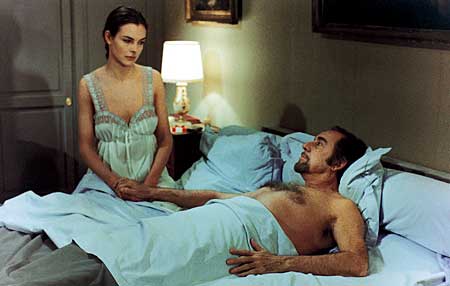Add to this the complication of some anticipated horror—say, the absurd, impossible possibility of a terrorist event (I'm also dimly aware of urban structures, landmarks like the TransAmerica Pyramid, the Bay Bridge and the Golden Gate and the persistent imagining of their sudden destruction), and I couldn't be more ready to appreciate That Obscure Object of Desire. Buñuel's career capper was a startlingly lucid dream of the conjoined fearful wishes for sex and death. What more could you ask for?
Against a backdrop of encroaching European terrorism, Mathieu, a wealthy, middle-aged Frenchman, becomes obsessed with his beautiful and much younger maid, Conchita, and devotes all his resources to courting her. Conchita is a formidable coquette; she does respond to his advances, but very pointedly on her own terms. She tells Mathieu she's a virgin and will not allow him to have sex with her, which drives him crazy. As Conchita's relish for tormenting him becomes clear, so does Mathieu's craving for being tormented—and their doomed bond is sealed.
"If I give you what you want," she says, "you'd stop loving me." Now if that's true, the therapists and columnists will tell you, it probably wasn't love to begin with. But who needs such obvious, useless prudence now? Is it not better to have l'amour fou than never to have l'amour at all? I think so, consciously. And as analysts of my romantic history would certainly conclude, subconsciously, too.
What makes this movie great is that it's a perfect and unique match of subject and style, a fearless look at real erotic obsession, including the hopeless and giddy and shocking cruelty that lovers inflict on one another and the final irrelevance of all explanations. That Obscure Object of Desire is profoundly universal, yet only the idiosyncratic iconoclast Buñuel could make it. It's endearing and infuriating at once, and it will not be classified as a cautionary tale. It will not be classified at all, except as purely Buñuellian. Without revealing too many of the pulse-pounding details of the characters' affair, I will tell you that the film ends, correctly, with a fiery, full screen explosion.
Of course, neither Rialto Pictures (www.rialtopictures.com), which re-released it several months ago, nor the director, who made it in 1977 and died in 1983, could claim to presage America's new war. And watching That Obscure Object of Desire should not be the first order of American business today. But I think it belongs on the priority list, perhaps because I imagine Buñuel would have no part of the "getting back to normal" rhetoric. He seemed to consider normalcy a poison even more destructive than violent uncertainty.
Luis Buñuel began his film career with one of cinema's most enduring and repulsive images. If people remember nothing else of Un Chien Andalou, the 24-minute surrealist staple he made with Salvador Dali in 1929, they will remember a razor blade drawn across an open eyeball. I dare not even try to think of a more potent literal assault on old ways of seeing. Broadened by dark humor and a deep interest in the inherent drama of frustration, Buñuel's already unsettling aptitude for provocation became a social force to be reckoned with: The Exterminating Angel (1962) and The Discreet Charm of the Bourgeoisie (1972) featured, respectively, a house from which the guests can’t seem to leave and a dinner party at which they can’t seem to eat—both due to the absurd paralysis induced by bourgeois etiquette. Belle de Jour (1967) was banned for looking too closely at the sexual liberation of perversity.
Buñuel routinely hedged about his striking and controversial techniques. Whether by avoiding interviews altogether or shrugging and slipping through them, he disavowed heavy-handed psychological intentions or hidden meanings and swore allegiance to the id-impulse of dreams. "An author has two ways of developing a narrative," he once said, "either he can impose an intellectual or moral direction on it, or he can allow things to arise according to how they happen and how he feels or thinks them." It could be an infuriating, pretentious-seeming cop out or, perhaps, a refreshing, invigorating and necessary new aesthetic. Either way, it would keep you coming back.
This was always Bunuel's gift—to confound, contradict and surprise, yet somehow remain unequivocal and deeply, simply expressive. He cultivated mystery, and mystery is elemental to desire. It is what separates the erotic from the merely pornographic. Buñuel went from a cinema of repulsion to one of equally strong attraction; he knew intuitively that fetishizing the unattainable is what film does best. "In none of the traditional arts is there such a wide gap between possibilities and facts as in the cinema," he said.

This is not to give him full credit for the magnum opus, That Obscure Object of Desire. Pierre Louys' 1898 novel, La Femme et le Pantin, ("The Woman and the Puppet") has been adapted for the screen six times, notably in Joseph Von Sternberg's 1935 production The Devil is a Woman, with Marlene Dietrich as both. Still, Buñuel's version (written by Buñuel and his longtime collaborator, Jean-Claude Carrière) is the nonpareil. He makes a thematic centerpiece of keeping his protagonist from consummation. Louys was kinder.
That Obscure Object of Desire bears a mature poise, but not at the expense of the director's early force. It proves not only that the surrealist mandate is never out of date but also, ultimately, that it's the only real means by which to properly examine human longings.
It's not that I find women interchangeable. The variety and mystery of female attractiveness astounds me. I don't have a "type," and I don't trust anyone who does. Nor should you. I like to suspect that Luis Buñuel, the artist, felt the same way. This is, of course, far too facile an explanation for his final film's most notorious creative choice, the unapologetic use of two distinct actresses to play a single role—the title role, if there is one.
The part of Conchita originally went to Maria Schneider, whose penchant for on-screen eroticism was firmly established by her intense scenes with the groping, musky Marlon Brando in Bernardo Bertolucci's Last Tango in Paris. But things didn't work out between Schneider and Buñuel. The lore recounts that she couldn't make reasonable sense of a character so maddeningly capricious. As Buñuel told it, he then impulsively suggested two actresses for the role. And since no one told him it was a stupid idea, he cast the angular, French, coolly elegant Carole Bouquet and the sunny, Spanish, lissome Angela Molina and divided Conchita's scenes between them.
That Mathieu (played by Buñuel regular Fernando Rey) seems not to perceive the two distinct people needn't be a cinematic conceit. His fixation depends only on the obscure object. "Do what you want with other girls. I can give you some names if you like. But I'm me," Conchita says. "What I want is quite different." Mathieu may or may not make reasonable efforts to understand what she wants and she may or may not make reasonable efforts to show him, but in the end it doesn't matter. "If I marry her," he later confides, "I'll be completely helpless." Sexual politics are by definition surreal.
Actually, That Obscure Object of Desire is the perfect date movie. That's because it's dangerous. It might well wreck the status quo of a relationship. You'll go back and forth for a long time on who deserves what and why. You'll take sides, and this will inevitably reflect the bias formed of your earliest or most vivid erotic experiences. You'll remember your own embroiled desires, your most disastrous or profoundly successful affairs, your hopeless obsessions—as I did, whether I liked it or not.
 |
For instance, you could argue that Mathieu's situation is a purgatory, unending and deeply hurtful in ways that being obliterated in an unanticipated explosion are not. Or you could argue that he's a lout and how dare he try to possess her, to buy her, as he (arguably) does? You could argue that his obsession is a refusal to acknowledge the rules of an absurd and deadly real world in favor of the sustained invigoration of chasing the unattainable. Or that he's inexcusably aloof, insulated by his wealth and privilege, with too damn much leisure time and no social conscience; he deserves what he gets—or doesn't get. You could argue that Mathieu should not take Conchita's abuse, that her cruelty makes her a hypocrite. Or that she's just as obsessed with being the obscure object of Mathieu's desire as he is with having her.
These arguments cannot be won. And the only thing I can think of to dispatch them, albeit temporarily, is feverishly good sex.
I would want Conchita, too—both of them. Or someone else, equally fragmented, two-faced and elusive, glimpsed at random in another city and another language, even an unspoken one. And I would pursue her, beyond the warning signs, the obvious danger, beyond the frontier of futility. I would pursue her or be lost otherwise, and I would kiss her foot and buy her a house, if that's what she wanted, and strike her for humiliating and hurting me so deeply. And I know what that makes me, and I don't have a reason or a regret.
In truth, I'm much happier when mired in obsessions and hopeless hopes, feeling my heart beat and break instead of pretending to reasonably understand it. That's why I respond to Buñuel. And it has always been my way of coping in a ridiculous and impulsive and dangerously violent—but also unbelievably beautiful—world.
That Obscure Object of Desire was recently released on DVD by the Criterion Collection (www.criterionco.com).